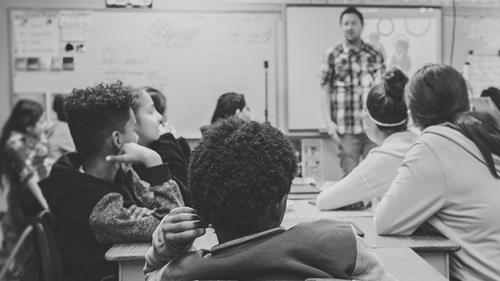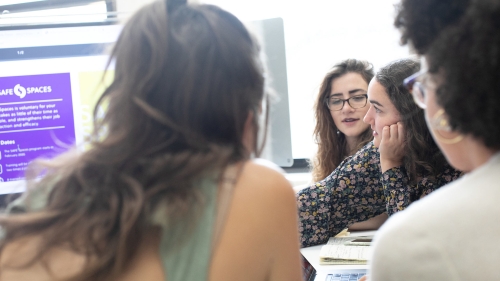In its position as a thought leader in education and driver of a holistic and integrated approach to human development, NYU Steinhardt, led by four research centers and programs, hosted “Reimagining the Role of Schools in Society: A Conversation and Call to Action” on May 26, 2021

This roundtable panel of experts discussed the possibilities of using the disruption of the COVID-19 pandemic to rethink the structure and responsibility of US schools.
The pandemic magnified an already critical learning crisis around the world in which differences in students’ income levels, geographic location, race and ethnicity, and a host of other factors seriously impact the outcomes of their education. Because of pandemic-related learning loss in 2020, estimates show that students will earn 2.2 percent less over their lifetime–up to 3.3 percent for Black students. In addition, 46 percent of Black K-12 students received low-quality remote instruction in 2020.
Jim Kemple, executive director of the Research Alliance for New York City Schools, set the stage for the discussion with his opening remarks.
“I want to caution everyone that nostalgia can be a dangerous thing,” said Kemple. “Reflecting uncritically on the past can blind us to longstanding problems that actually mirror the daunting challenges we face currently. Today’s event is a call to remove those blinders and avoid the temptation to simply “return to normalcy. The past 15 months have given us a rare opportunity to see the inequities in education and to respond by building the schools we want, not rebuild the ones we had.”
Latest Research from Young Scholars
The event began with a presentation of topical research from NYU Steinhardt students and affiliates:
- Chelsea Daniels (PhD student in sociology at NYU College of Arts and Science) has partnered with Steinhardt’s Research Alliance on using data to identify student need across multiple measures such as economic need, housing instability, police contact, and digital disadvantage in New York City schools in the aftermath of the pandemic.
- Olga Pagan (PhD student in Steinhardt's Department of Applied Psychology) detailed her work on racial silence–the avoidance by teachers of discussing race and racial issues in class–and what teachers need from schools to help alleviate tension and increase. transparency in these conversations.
- Sarah Rosenbach (PhD student in Steinhardt's Department of Applied Psychology) delved into her work reimagining how schools can support LGBTQ youth who face higher rates of suicide and bullying.
Input from Industry Experts
“Reimagining the Role of Schools in Society” also included discussion on the topic of reinventing schools to better serve societal needs, led by leaders in the field:
- Melinda Anderson, Education Journalist and Author (moderator)
- Dr. Marc Atkins, Director, Institute for Juvenile Research, University of Illinois at Chicago
- Denise Forte, Interim CEO, The Education Trust
- Dr. Shabnam Javdani, Associate Professor of Applied Psychology, NYU Steinhardt, and Associate Faculty Director, NYU Prison Education Program
- Ralph Smith, Managing Director, Campaign for Grade-Level Reading
Overarching themes from the experts included reimagining schools as a place of healing for students who need it, as well as a stronger recognition that the pandemic has jeopardized the aspirations of disadvantaged students everywhere–and the ways in which we need to build a plan of action and an inclusive system to ensure that stops happening.
A number of Steinhardt’s centers and programs co-sponsored the event: the Institute of Human Development and Social Change (IHDSC), the Institute of Education Sciences-funded Predoctoral Interdisciplinary Research Training (IES-PIRT) program, the Center for Practice and Research at the Intersection of Information, Society, and Methodology (PRIISM), and the Research Alliance for New York City Schools (RANYCS).
Related Department

Applied Psychology
246 Greene Street , New York, NY 10003
P: 212-998-5555
E: applied.psychology@nyu.edu
